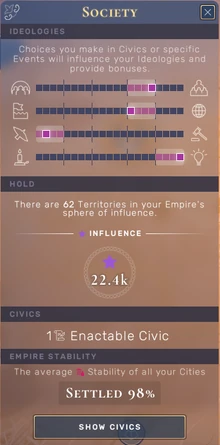
Society Panel
Ideologies are how the values and structures of your Empire are presented in the game.
There are 8 different ideologies (or ideological positions) on 4 Ideology Axes, and the position of your Empire's ideology is marked by a purple square on each Axis. You can check your ideological positions on the Society Panel and whenever you are making a choice regarding civics and Narrative Events.
Every choice of a civic and every choice in a Narrative Event will change your Empire's position on the Axis, therefore shaping and defining your society through the decisions you made during the gameplay.
Different Ideologies will always provide a bonus to your Empire, which depends on the position on each Ideological Axis.
Each Empire has their own unique ideology, and there will be differences between different Empires' ideologies. As a result, these differences will be measured in the form of Ideological Proximity, which can influence the diplomatic relationships - including Attitude, and especially regarding negotiating Treaties and War Support - between Empires.
Ideological Axis and Positions[]
There are 8 different ideologies (or ideological positions) on 4 Ideology Axis: Economy, Geopolitics, Government, and Society. Each Axis has 2 positions on the left and right.
| The Economy Axis | |
|---|---|
| Collectivism
The choices taken emphasize socialized measures, regulations on the economy, collectivized decisions, etc. |
Individualism
The choices taken emphasize deregulation, shifting power to private entities, supporting individual interests instead of collective ones. |
| The Geopolitics Axis | |
| Homeland
The choices taken emphasize group defense, exceptionalism, militarization for reasons against other groups, etc.
|
World
The choices taken emphasize cooperation, humanism, universalism, militarization for reasons of unifying groups, etc. |
| The Government Axis | |
| Liberty
The choices taken emphasize people taking initiative in organizing their society, in what they express, in what they say to the political structure, etc.
|
Authority
The choices taken emphasize controlling any dissidence, in policing more or less closely the population, defining what people are allowed to do and not do in a top-down manner, etc. |
| The Society Axis | |
| Tradition
The choices taken emphasize doing things as they have always been done, repudiating new ways of seeing the world, etc. |
Progress
The choices taken emphasize changing how things are done, searching for new ideas, questioning tradition, etc. |
Ideology Effects[]
Every Ideology Axis constitutes a total of 21 boxes, and the square indicating your ideological position will always stay in one of the boxes.
The 21 boxes are divided into 5 positions: The leftmost 4 boxes, the middle-left 4 boxes, the middle 5 boxes, the middle-right 4 boxes, and the rightmost 4 boxes. Different ideological positions can provide different bonuses and effects.
In addition, if the Empire's Ideological Position is around the middle of the Axis, the ideological effect will be only about Stability.
You can check ideology effects by hovering mouse over the Ideology Axis on the Society Panel, or on the ideology indicator on the individual civic's window.
| Ideology | Leftmost Effects | Middle Left Effects | Middle Position Effects | Middle Right Effects | Rightmost Effects | Ideology |
|---|---|---|---|---|---|---|
|
Collectivism |
+10% on City or Outpost | +10 on all Cities | +10% on City or Outpost |
Individualism | ||
|
Homeland |
+2 on Unit | +10% on City or Outpost |
World | |||
|
Liberty |
+4 on Emblematic District |
|
Authority | |||
|
Tradition |
+4 on Territory | +10% on City or Outpost |
Progress |
Ideological Proximity[]
Each Empire has their own unique ideology, and there will be differences between different Empire ideologies. The ideological differences can be measured in Ideological Proximity, which will influence the diplomatic relationships - including Attitude, especially regarding negotiating Treaties and War Support - between Empires.
There are 3 levels of proximities:
- Distrust: The ideological differences between your Empires are stark, making it difficult to collaborate (i.e., difficult to sign Treaties). The other side's War Support only increases slightly if you break agreements with them, while declaring war against them does not decrease your own population's War Support.
- Tolerance: Despite a few ideological differences, your Empires are able to mostly get along. War Support is gained when the other side breaks a Treaty, and is drained each turn from the side which declares war.
- Kinship: Your Empires have few ideological differences, making cooperation smooth and easy (i.e., easy to sign Treaties). The other side's War Support increases if you break Treaties with them, and declaring war against them severely decreases your own population's War Support.
If two Empires' position on Ideological Axis are similar to each other, the two empires can enjoy a close Ideological Proximity.
The Cultural Agreement Alliance Treaty will also gradually rise the Ideological Proximity of both Empires to a higher level.
If an Empire has the Aesthete Affinity, its Ideological Proximity will be set to maximum with all other Empires.
